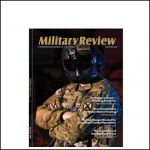
e-Document
|
Military Review, March-April 2004.
Copies
0 Total copies, 0 Copies are in,
0 Copies are out.
Have We Found the Manning Holy Grail? Lieutenant Colonel S. Jamie Gayton, U.S. Army; The Army has worked hard to improve its capabilities through technical innovation and has been successful in all areas except onethe manning of its units. With Force Stabilization, the Army is set to transform how it mans units, making unit manning into a strength that leads change.
The Modular Army. Colonel John A. Bonin, U.S. Army, Retired, and Lieutenant Colonel Telford E. Crisco, Jr., U.S. Army; The Army is seeking to solve its organizational design dilemma by retaining the advantages of relatively fixed structures as the basis for tailoring the force while furthering a commanders ability to creatively reorganize it to meet specific tasks. To achieve strategic responsiveness, deployability, modularity, and tailor ability, the Army needs self-contained combined arms units smaller than current divisions.
The War on Drugs and Terrorism: El Salvador and Colombia. Major General Alfred A. Valenzuela, U.S. Army, and Colonel Victor M. Rosello, U.S. Army; The war against drug trafficking and terrorism in Colombia continues to entice the United States. In the 1980s, El Salvador became a line in the sand. U.S. support included a sustained commitment of military advisers and a security assistance package. If the U.S. is serious about countering drug trafficking and terrorism in Colombia, it might be able to apply the El Salvador model to Colombia.
The Significance of Conventional Deterrence in Latin America. Jaime Garca Covarrubiqas, Ph.D., National Defense University, Washington, D.C.; Latin American countries prefer conventional (classical) deterrence as the political and strategic model of choice, but reconciling cooperation with deterrence is difficult. These countries must determine their new roles amid new threats and opportunities in a world that grows more conflict-ridden each day.
Improving Strategic Leadership. Colonel Michael Flowers, U.S. Army; The increased variety and complexity of current missions place a greater demand on the force than ever before. The Army must redefine the paradigms of development associated with traditional levels of execution and leadership.
Israel and the War of Attrition. Robert S. Bolia, U.S. Air Force Research Laboratory, Ohio; The 1967-1970 War of Attrition between Israel and Egypt is the least well known of the six wars Israel has fought since its independence in 1948. The war, which featured massive air strikes, artillery bombardments, and commando raids, was a testing ground for new weapons, including unmanned aerial vehicles. Both Israel and Egypt claimed victory, and the Yom Kippur War quickly followed.
Constitutional Covert Operations: A Force Multiplier for Preemption. Matthew S. Pape, J.D., Dallas, Texas; The events of 11 September 2001 demonstrate that a new breed of enemy existssinister conspirators who use asymmetric warfare to bring death, destruction, and terror to Americans. To defeat this new foe, the United States must alter its view of the world and its self-imposed constraints on the use of force. The new threat demands a proactive approachpreemptive action.
Review Essays
The Continuing Influence of Clausewitz. Lieutenant Colonel Walter M. Hudson, Instructor, U.S. Army Command and General Staff College, Fort Leavenworth, Kansas; Although John Keegan has an outright distain for Clausewitz, he inadvertently uses Clausewitzian language in his book Intelligence and War. Hudson wonders if Keegan has changed his mind about Clausewitz or has unconsciously appropriated Clausewitzian ideas.
McClernand: Politician in Uniform. Lieutenant Colonel Edward Kennedy, U.S. Army, Retired, Leavenworth, Kansas; Award-winning author Richard L. Kiper describes Union General John Alexander McClernand as a man whose military career was tarnished by his unbridled political ambitions. McClernand blamed his fellow West Pointers for causing him difficulties and stifling his career. Kiper illuminates the events of McClernands career, showing that McClernands ego was the cause of most of his problems.
Bookshelf
Suggested Reading for Military Professionals. Major Dennis P. Chapman, U.S. Army, Fort Sam Houston, Texas; Chapman writes that to get into a habit of lifelong learning, Army officers need to share what they read and study so others might gain from their efforts. Here he describes several of his favorites.
Book Reviews contemporary readings for the professional
Letters
Title
Military Review, March-April 2004.
Call No
CDMC Military Review
Digital Link
Subjects
Transformation Modular army, logistics Terrorism, counterterrorism Drug warfare El Salvador Colombia Nicaragua Joint operations areas Lessons learned Deterrence operations Battle command Information operations, Iraq War of attrition, Israel McClernard Middle East Clausewitz, leader development training
Language
English
Published
Fort Leavenworth, KS : Combined Arms Center,, 2004.
Series
Target Audience
Unknown or not specified









